Chapter 7
The Ultimate Guide to Local SEO For Lawyers
What is Local SEO for lawyers?
Local SEO, short for local search engine optimization, involves optimizing a business’s online presence to attract local customers. Local SEO for law firms is essential as it boosts your law firm’s visibility in local search results, helping you reach potential clients in your geographical area.
Have you ever wondered how certain firms dominate the online scene? A big part of it involves mastering Local Map Pack rankings.
Let’s explore the intricacies of the Google Local Map Pack, understand its importance for law firms, and unveil a step-by-step guide to local SEO for attorneys.
Google Local Map Pack For Law Firms
The Google Local Map Pack, also referred to as the Local Pack or local-3 pack, is a prominent feature in Google’s search results. It is specifically designed to highlight local businesses in response to a user’s query.
This section typically appears at the top of Google’s Search Engine Results Pages (SERPs), preceding traditional organic search results. This is especially true when the search has local intent. In the context of law firms, when a user searches for legal services with a location-specific term, the Local Map Pack displays a map alongside a curated list of three relevant local law firms.
For example, if a user searches for “personal injury attorney in Florida,” the Local Map Pack will show a Google map of Florida pinpointing the locations of top-ranking law firms in this practice area, accompanied by a concise listing of three such firms.
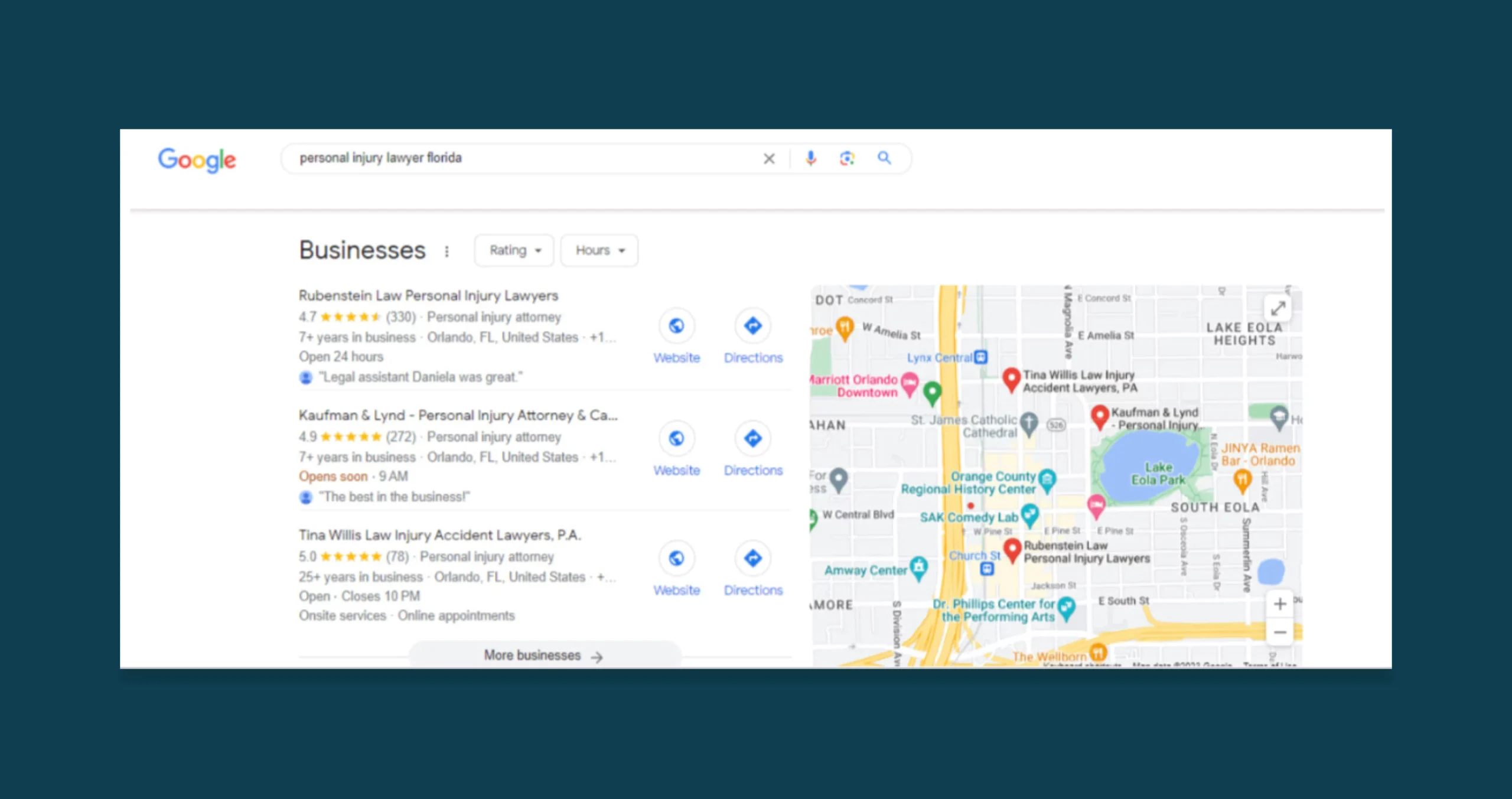
This listing includes vital information about the firm, and provides users with immediate and easy-to-navigate options. The prominence of the Local Map Pack in search results, appearing over 90% of the time for local queries, underscores its importance for lawyers aiming to increase their local online visibility and attract potential clients in their area.
Why Law Firms Should Strive for Map Pack Rankings
The Google Local Map Pack is essentially a VIP list. Among the countless law firms, you want to be one of the three highlighted at the top of the search page.
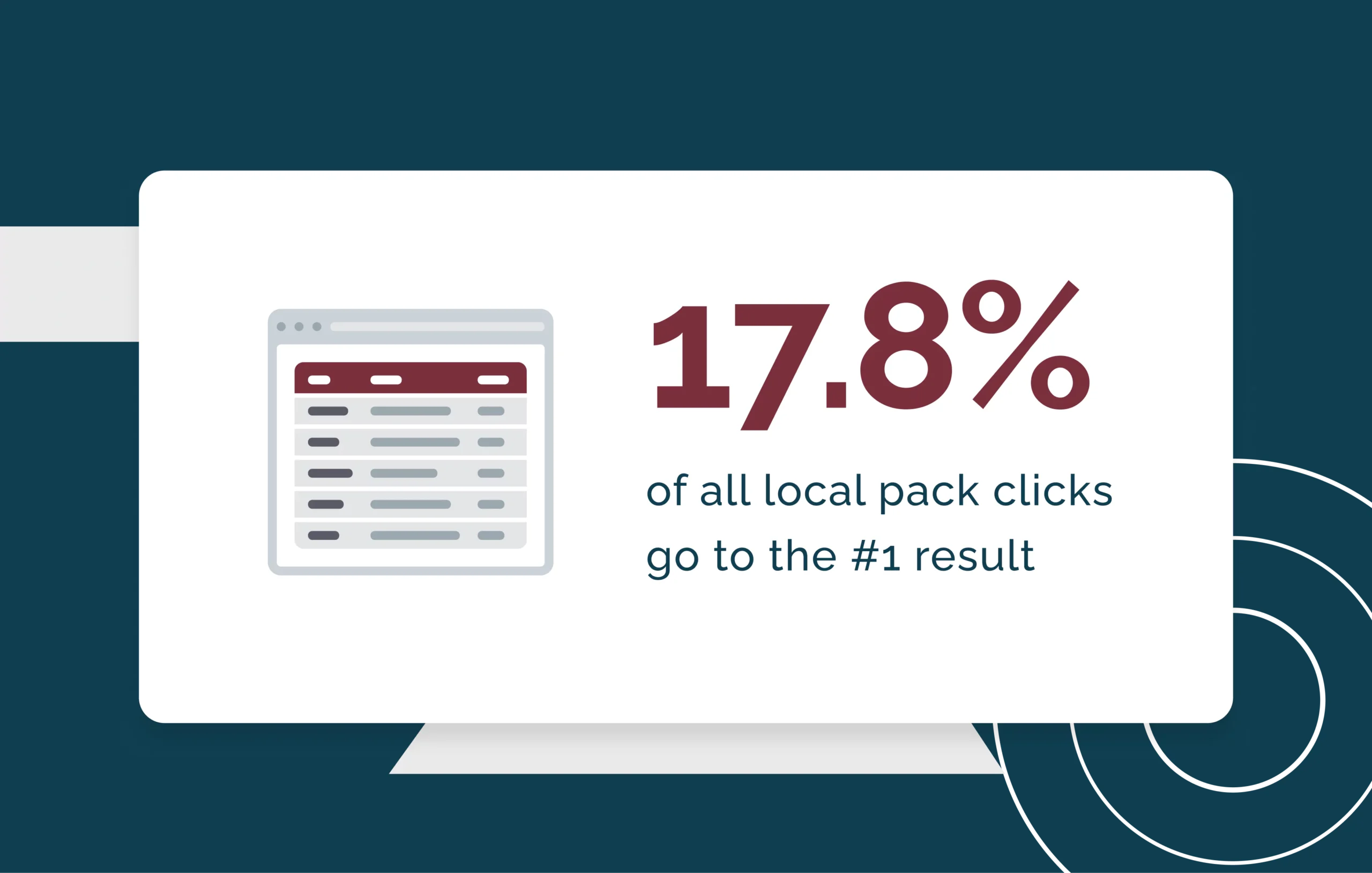
A recent study found that 17.8% of local pack clicks go to the #1 result. Close behind, position number two takes 15.4%, and position three takes 15.1% together, that accounts for almost 50% of all clicks!
Think about it – nearly 50 out of every 100 people choose to click on the top 3 listings. If you’re not aiming for a spot in this exclusive club, you’re missing out on significant visibility and potential clients for your law firm.
Given this context, let’s delve into why securing a spot in the Map Pack is especially critical:
- Client Proximity: Legal issues are often sensitive and personal. Clients prefer local firms as they are more accessible for meetings and court appearances, and they have a perceived understanding of local laws and regulations.
- Intense Competition: The legal field is notoriously competitive. Local SEO allows firms to stand out in their specific area, reducing the noise from broader national or global competition.
- Highly Targeted Marketing: Local SEO strategies, like using specific geographical keywords, target individuals actively seeking legal services in your area. This leads to a higher conversion rate as the traffic is more relevant.
- Cost-Effective: Local SEO for law firms is relatively cost-effective compared to broader SEO strategies. It focuses on smaller, more targeted audiences, meaning you’re using your resources wisely.
- Mobile Searches: With the rise of mobile internet usage, searches like “lawyers near me” have become increasingly common. Local SEO ensures that your firm shows up in these critical moments of immediate need.
- Community Integration: Being visible locally integrates your firm into the community. This can lead to organic growth through word-of-mouth, local partnerships, and community engagement.
How Google Ranks Local Businesses
Google’s local ranking factors, primarily relevance, distance, and prominence, determine whether your firm makes it to the top of local search results. Understanding these factors is crucial in devising effective Local SEO strategies.
Relevance
“Relevance refers to how well a local Business Profile matches what someone is searching for.” – Google
Relevance focuses on how well a law firm’s services match a user’s search intent. It considers the alignment between a user’s query and the information provided on your law firm’s local Business Profile.
Completing your Google My Business profile with detailed, accurate information helps show Google your listing is highly relevant.
Distance
“Distance considers how far each potential search result is from the location term used in a search.” – Google
If a user doesn’t specify a location in their search, they calculate distance based on what they know about a user’s location. Updating location information on Google My Business and other online directories helps improve distance relevance.
Prominence
Prominence measures the visibility and recognition of a business, both online and offline. A law firm’s prominence is influenced by factors such as the quantity and quality of online reviews, backlinks, and citations. The more reputable and well-regarded a firm is across various platforms, the higher its prominence
How to Improve Your Law Firm’s Local Search Rankings
Now, let’s get down to business. How do you get your law firm to the top of these local search rankings?
Step 1: Claim and Optimize Your Google Business Profile
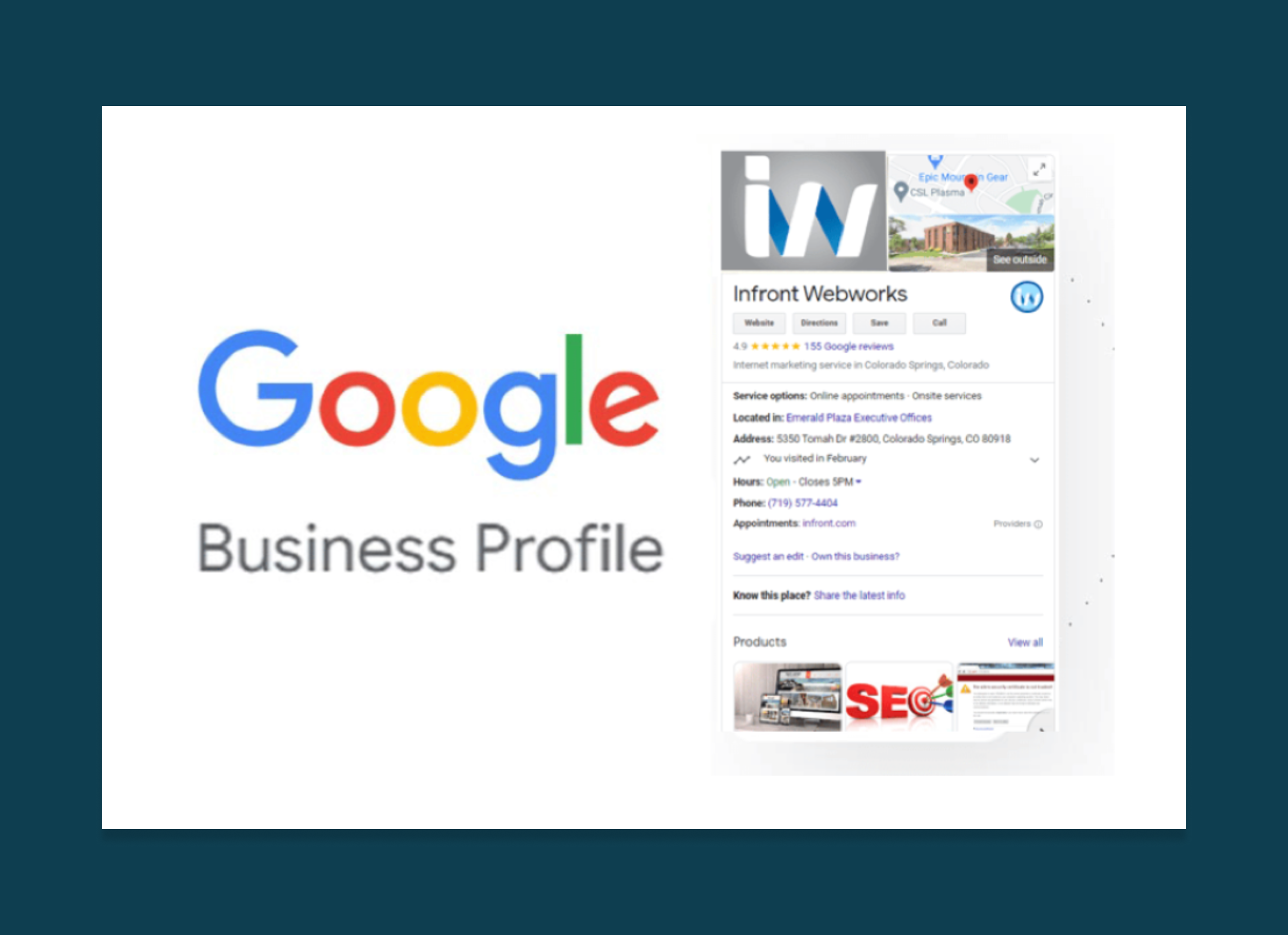
From 2015 to 2021, the significance of Google Business Profile for Local Pack ranking has surged, rising from 15% to a peak of 36%. In 2023, this percentage slightly decreased to 32%, yet it remains the factor rated as most important.
Your Google Business Profile is your firm’s virtual front door. Let’s make sure it’s impressive.
Nail the Basics
Ensure your name, address, and phone number are accurate. It’s like making sure your office sign is visible and your receptionist answers the phone.
Choose the Right Category
The primary category helps Google understand exactly what you offer. It holds more weight in terms of rankings than secondary categories.
Are you a “Divorce Lawyer” or an “Estate Attorney”? Make it clear. Avoid being too vague with categories like ‘Law Firm”. You can use more general terms for your additional or “secondary” categories, as shown here.
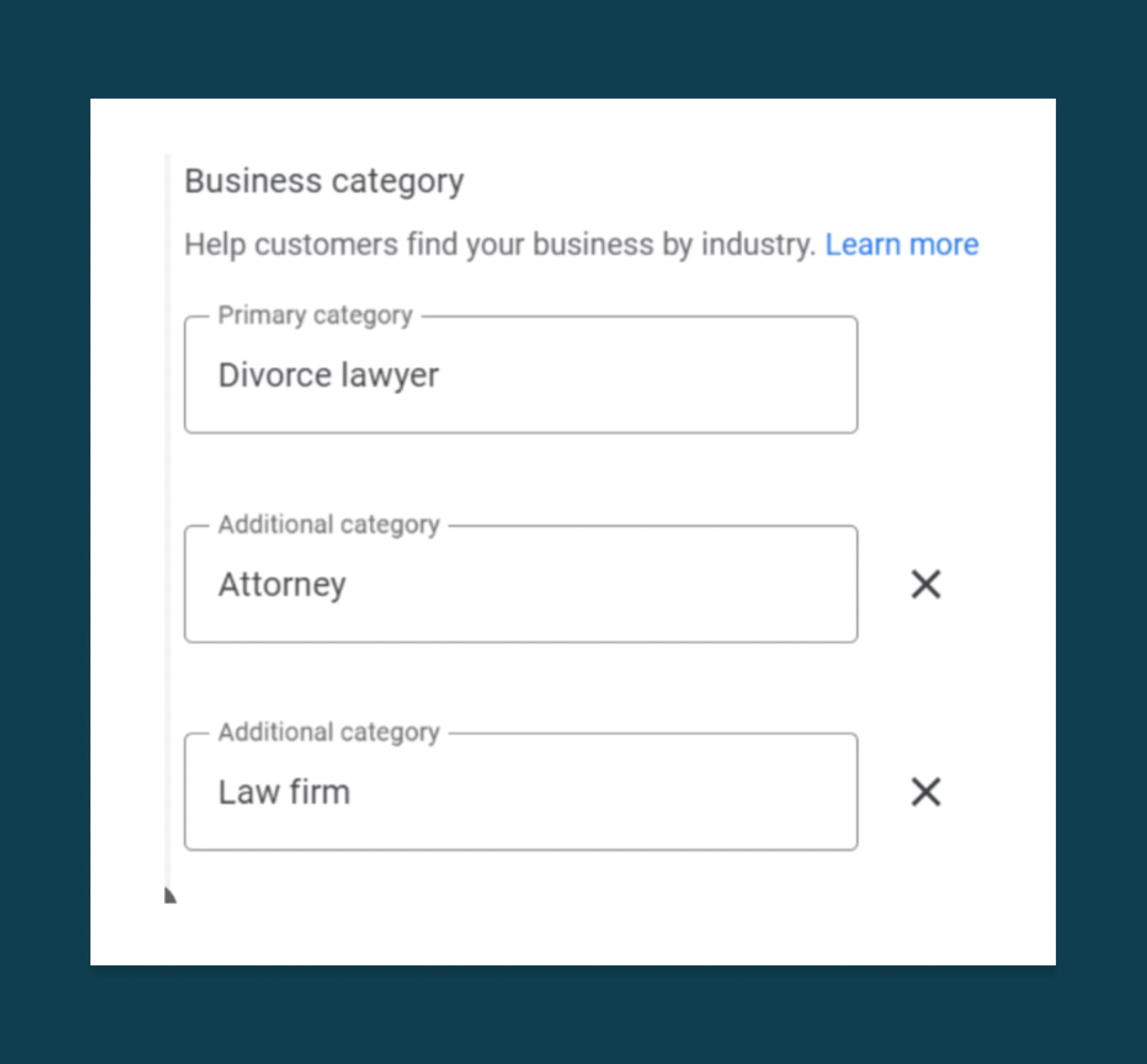
A Picture is Worth a Thousand Words
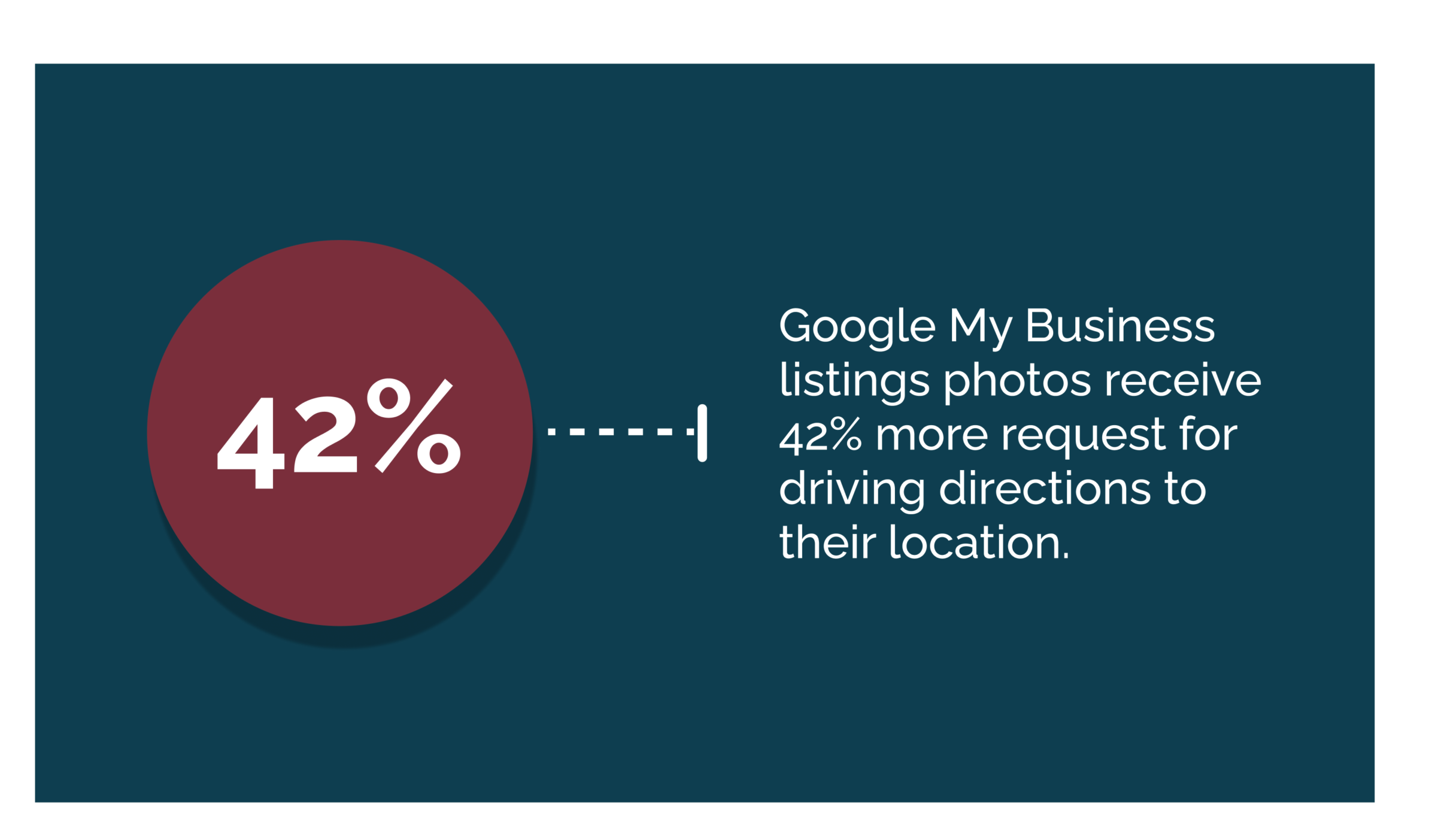
- Businesses with more GMB photos get more clicks, calls and direction requests
- Businesses with more than 100 images get 520% more calls than the average business, while those with just one image get 71% fewer.
- Businesses with more than 100 images get 1,065% more website clicks than the average business, while those with just one get 65% fewer.
- Businesses with more than 100 images get 960% more search views than the average business, while those with just one get 62% fewer.
- Businesses with more than 100 images get 3459% more maps views than the average business, while those with just one get 71% fewer.
- Businesses with more than 100 images get 713% more discovery searches than the average business, while those with just one get 65% fewer.
Engage with FAQs
Populate your profile with frequently asked questions and answers. Imagine a potential client wondering about common legal issues; your answers could be what convinces them to call you.
Select “Ask a Question” on your GBP, and input the question in the text box. Once published, respond to it with your answer. Repeat this process until you’ve addressed the most frequently asked questions about your business on your profile.
Reminder – This is a great place to input your target keywords, just don’t overstuff.
Step 2: Cultivate and Manage Reviews
Reviews are like personal recommendations. The more you have, and the better they are, the more trustworthy your firm appears.
Here’s what Google says about reviews:
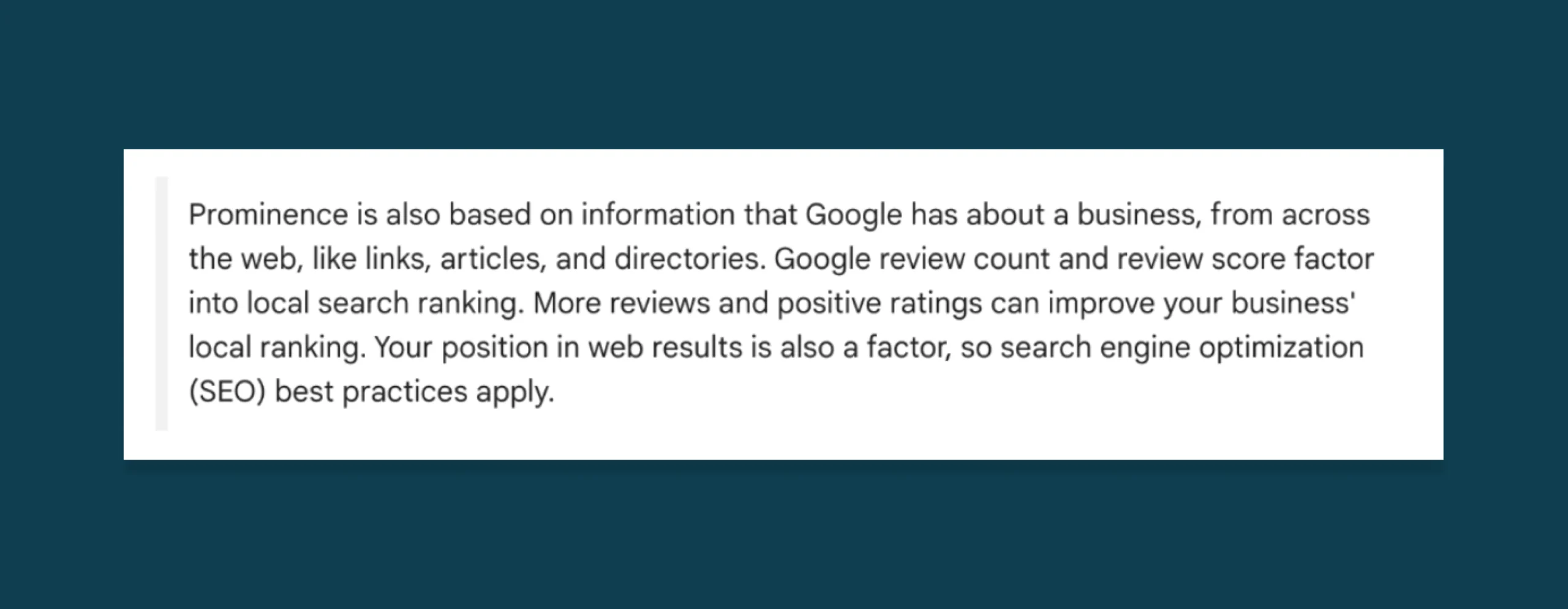
Encourage Happy Clients to Review: After a successful case, gently nudge your client to leave a review. Perhaps send a follow-up email with a direct link to your review page.
Responding to Reviews
A prevalent misconception is that responding to negative reviews is sufficient. It’s a natural instinct – wanting to defend your practice, especially in a public forum.
Nevertheless, there’s merit in responding to all reviews, be they positive, negative, or somewhere in between. Consider reviews as content. Studies consistently show that longer-form content tends to rank better.
When your local directories receive reviews, it bolsters their standing in search engines. Each review presents an opportunity to augment page content, enhancing your overall online presence.
Respond Like a Pro: Every review deserves a response. Thank clients for positive reviews and address any negative feedback with professionalism and care. It shows you’re attentive and care about client satisfaction.
Step 3: Build Local Citations
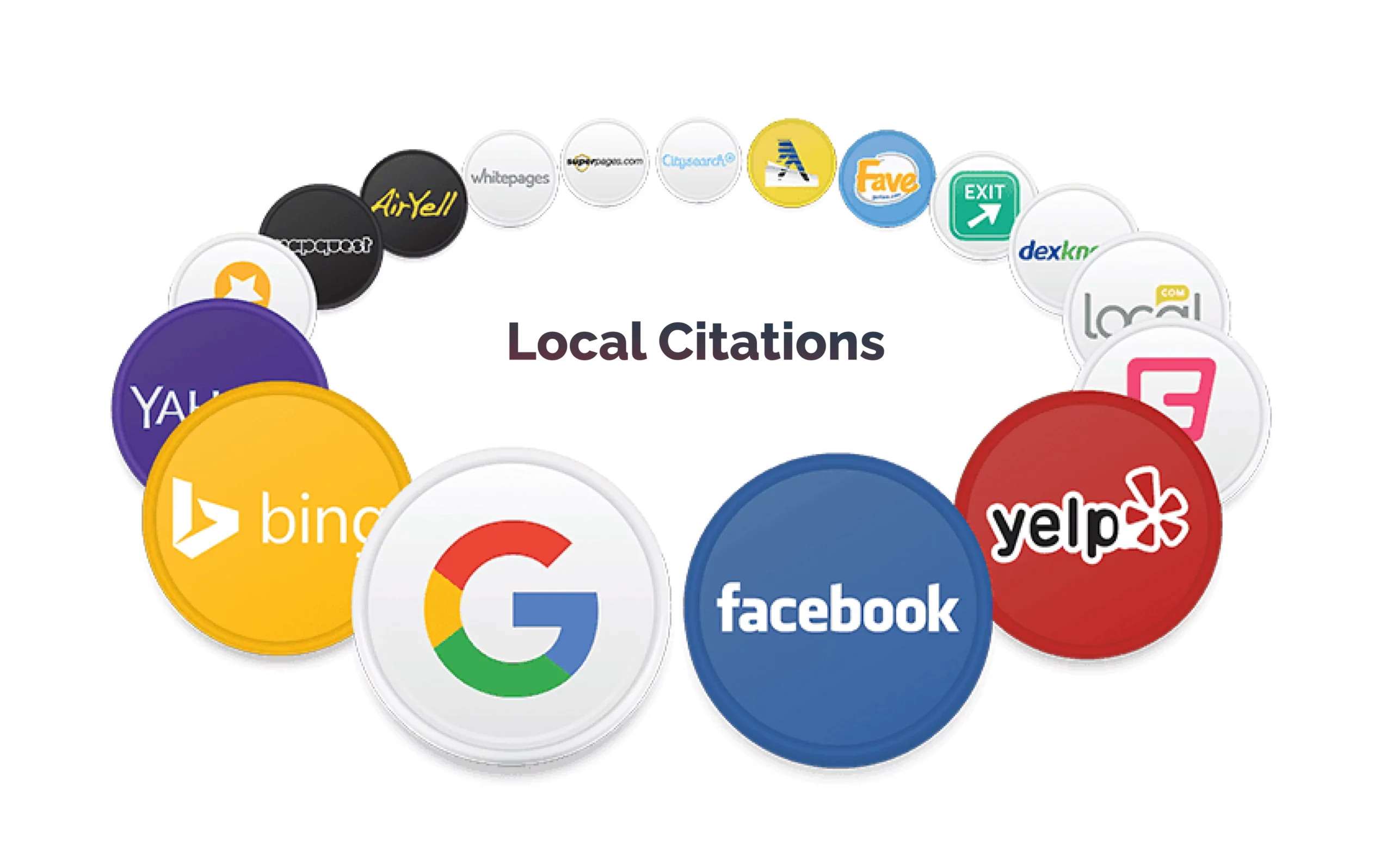
Citations are online mentions of your firm’s name, address, and phone number, often called NAP. They’re like digital breadcrumbs leading back to your firm.
Spread the Word
Get listed in legal directories like Avvo or FindLaw, and remember local business directories. Each citation is a nod to your firm’s presence and legitimacy, while also adding to your local link building.
Don’t know where to start? Here are the top 10 local citations in the U.S.
In addition to general directories like those listed above, be sure to have your law firm listed on the following legal-specific directories:
- Findlaw
- Justia
- Avvo
- Nolo
- lawyers.com
- hg.org
- martindale.com
- lawyer.com
- Law Guru
- Best Lawyers
Consistency Counts
Ensure your NAP is the same everywhere. Inconsistencies can confuse both Google and potential clients.
The surge in on-page signals from 17% in 2021 to 19% in 2023 underscores the growing importance of meticulous attention to crucial details for local map rankings. Among these critical details, maintaining NAP (Name, Address, Phone) consistency emerges as a pivotal factor.
Step 4: Optimize for Local SEO
This is where you fine-tune your website and online content to speak directly to your local audience.
- Keyword Smart: Use local keywords throughout your site. Instead of “personal injury lawyer,” use “Miami personal injury lawyer” if Miami is your base.
- On-Page Elements: Optimize your title tags, meta descriptions, and content with local terms. Think of these as the signposts that guide search engines and users to your site.
- Mobile-Friendly: Most local searches happen on mobile devices. Ensure your site is easy to navigate on phones and tablets.
Deepening Your Local SEO Strategy: Advanced Optimization Techniques

Go beyond the basics and delve into more sophisticated strategies to truly dominate the local search landscape. Following advanced techniques can significantly bolster your law firm’s local SEO efforts, providing a competitive edge and enhancing your visibility in the local map pack.
1. Structured Data Markup:
Local business schema is a type of structured data markup code that simplifies the process for search engines to comprehend the nature of your business and the services you offer. Essentially, this markup is a set of code that provides search engines with specific details about your firm, such as the business name, address, phone number (NAP), operating hours, client reviews, and other pertinent information.
Incorporating structured data markup enhances your firm’s visibility in local search results. More importantly, it enriches your listing in the map pack, making it more prominent and appealing to potential clients.
Rich Results:
Rich results, also known as rich snippets, are the upgraded versions of standard search results. They are visually more engaging and contain additional information presented in an organized format.
This could include images, ratings, reviews, and other metadata, offering a comprehensive snapshot of what users can expect on your site. Search engines generate rich results through the structured data markup on your website. They provide a more interactive and informative user experience, which can significantly improve your site’s click-through rates (CTR).
Here’s a practical example: Imagine a rich snippet for a law firm showcasing star ratings from client reviews, a quick summary of practice areas, and a striking image of the firm’s office. This enhanced search result not only captures the User’s attention more effectively but also provides vital information at a glance, making it more likely that a potential client will click through to your website.
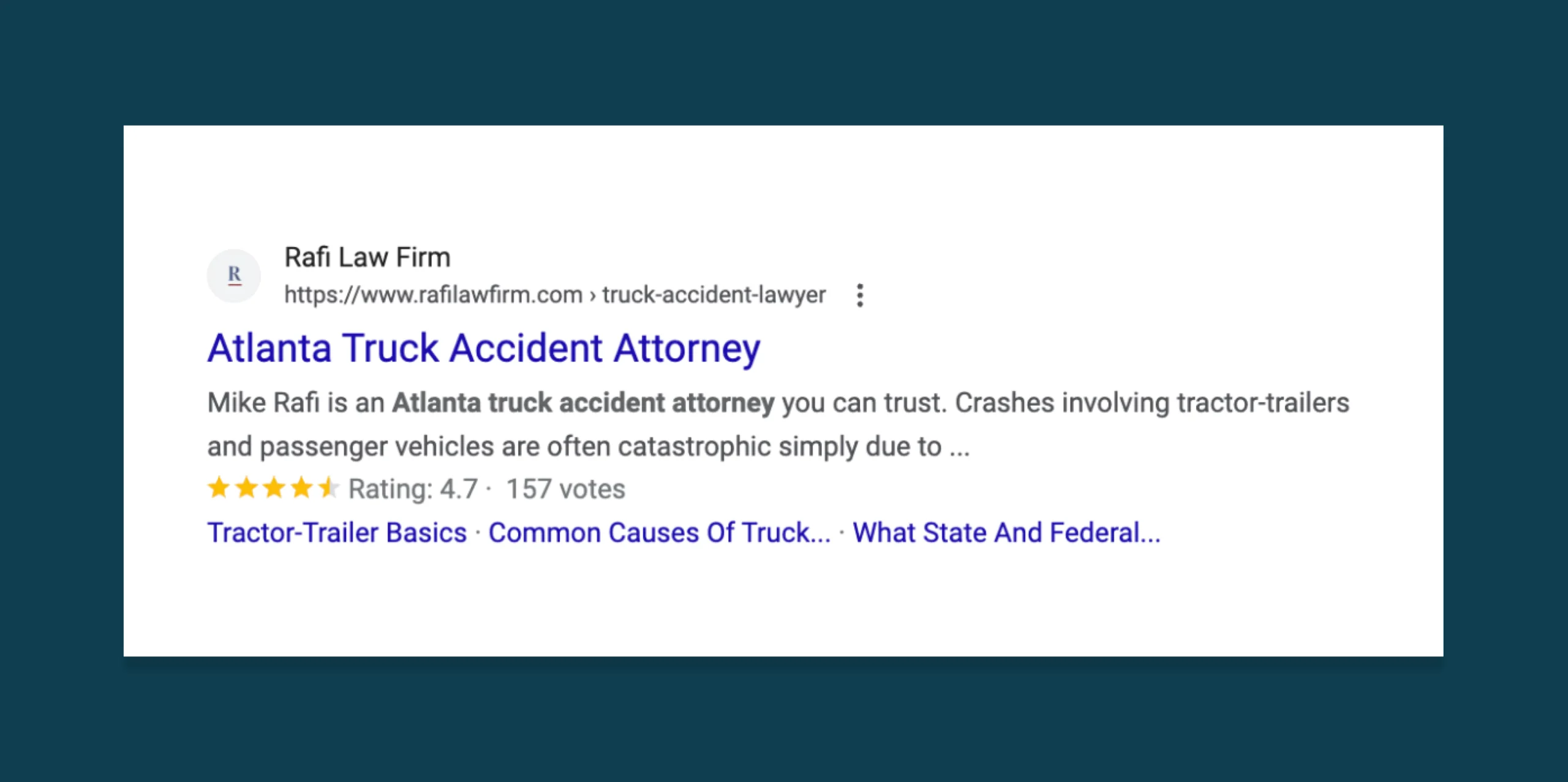
By embracing structured data and optimizing for rich results, lawyers can make a marked difference in their online presence.
You can read Google’s step-by-step instructions on how to add structured data here.
2. Acquiring Local Backlinks
Backlinks are the internet’s version of a good reputation. When local businesses, organizations, and legal associations link to your site, they’re vouching for your firm’s credibility. These local backlinks are precious as they reinforce your geographical relevance and authority.
Consider partnering with local charities or participating in community events. Each collaboration can lead to valuable backlinks and strengthen your local SEO.
3. Leveraging Google Posts

Regularly posting updates, offers, and events keeps your profile active and engaging. It’s a signal to Google that you’re actively managing your presence, providing fresh, enticing content.
4. Monitoring and Responding to Q&A
Your Google Business Profile’s Q&A section is a goldmine for engaging potential clients and boosting your local SEO. By actively monitoring and responding to questions, you’re aiding those seeking legal advice and demonstrating your firm’s commitment to community engagement. Each interaction is an opportunity to reinforce your expertise and visibility.
5. Creating Hyperlocal Content
Hyperlocal content is all about relevance. Developing content focused on specific neighborhoods, landmarks, or local events, speaks directly to your community’s interests and concerns. For instance, discussing how a new local ordinance affects residents of a particular area can position your firm as the go-to legal expert in that location.
6. Active Social Media Engagement
Your local presence isn’t limited to your website and Google Business Profile. Engaging with the community on social platforms can significantly boost your local visibility. Share local content, participate in discussions, and highlight your involvement in local events. This active engagement not only increases your firm’s local profile but can also indirectly influence your local search rankings.
7. Utilizing Local Phone Numbers
Using a local phone number with the area code of your location is a small but potent detail. It reinforces your local presence to potential clients and search engines, making it clear that your firm is a prominent player in the local legal landscape.
8. Keeping an Eye on Competitors
Understanding what your competitors are doing, especially those who rank well in the local map pack, can provide valuable insights.
Analyze their strategies, look for gaps in their approach, and find ways to differentiate and outperform them. This competitive analysis can guide your ongoing SEO efforts and help you stay one step ahead.
9. Tracking and Analytics
Lastly, what gets measured gets improved. Using analytics tools to track your local SEO performance is crucial. Understand where your traffic is coming from, what users do once they reach your site, and how your rankings change over time. This data will inform your strategies, helping you continuously refine and adjust to improve your local presence.
Remember, SEO is an ongoing process. Stay proactive, adapt to changes, and continuously strive for excellence. Your efforts will improve your local rankings and build a more substantial, more reputable online presence for your firm.
Expanding Your Law Firm Into New Territories
As your law firm grows, consider broadening your horizons. Each new location is an opportunity to tap into a new client base and further establish your firm’s reputation. Are you opening an office in a new city? Make sure you replicate your local SEO efforts for that location, too.
The Road to Local SEO Mastery
Becoming a master of Local SEO is a journey, not a destination. It demands ongoing effort, adaptability, and a deep comprehension of your local market dynamics. While optimizing your Google Business Profile, handling reviews, creating local citations, and tailoring your website to resonate with the local audience are essential steps, hiring a professional to guide you through this journey can significantly enhance your law firm’s success in the digital era.
Keep in mind that every stride you make toward enhancing your local presence brings you closer to establishing yourself as the trusted legal expert in your community.
LAW FIRM SEO GUIDE

“Hiring Everspark to do the comprehensive SEO audit of my website was money very well spent. They are thorough, knowledgeable and approachable.”
-Mike Rafi
READY TO PARTNER WITH ONE OF THE BEST DIGITAL MARKETING AGENCIES?
